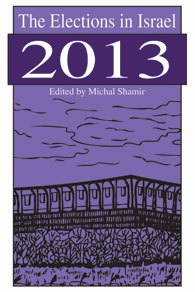The Elections in Israel 2013
Edited by : Michal Shamir
Release date: Jan 2015
Transactions Publishers
Nombre de pages: 274
ISBN: 978-1-4128-5609-6


The elections for Israel’s nineteenth Knesset were held on January 22, 2013. This volume offers an in-depth analysis of Israel’s 2013 elections from various perspectives. It presents an up-to-date picture of the complexity of Israeli democracy, and its challenges, achievements, and failures.
The chapters in this collection shed light on different facets of Israeli democracy. Yaron Ezrahi provides a skeptical perspective on prospects for democracy. Gayil Talshir explains the party system’s slowness to respond to citizen demands and to social movements. Michal Shamir and Keren Weinshall-Margel explore the politics of the right to be elected to the Knesset. Nir Atmor and Chen Friedberg highlight the decline in participation in Knesset elections in the Periphery versus the Center. Assaf Shapira and Gideon Rahat reveal the complexity of inter-party democracy. Dganit Ofek analyzes the stability of government coalitions. Gal Levy examines Mizrahi Jews and the Shas Party. Mtanes Shihadeh discusses the voting patterns of Israeli Arabs. Asher Cohen focuses on religious Zionism and the success of the renewed Jewish Home Party. Michal Shamir and Einat Gedalya-Lavy document a gender gap in voting.
Elections in Israel 2013 analyzes the give-and-take between the public and its leaders that is at the heart of elections. In doing so, it illuminates the role of elections in providing representation for different groups in Israeli society and in giving voice to their political choices.
Editorial Reviews
“This volume continues the tradition of the outstanding Elections in Israel series: it is an authoritative account of the 2013 elections; its contributors offer an astute and sophisticated window into the inner working of Israeli politics; and it skillfully traces those changes which presaged the fragility and ultimate instability of the subsequent Netanyahu government.
The unifying theme of this latest addition to the excellent series on Israeli elections revolves around the theme of Israel's troubled democracy. The perspicacious analyses of issues of representation, participation and voter behavior highlight key aspects of Israel's democratic recession and lay the groundwork for understanding the volatility and chronic instability which characterize the contemporary Israeli political scene.
Focusing on the 2013 elections which ushered in the third and short-lived government of Binyamin Netanyahu, this volume goes beyond its predecessors in the depth of its analyses, the scope of the research and the innovation it presents. It is a must-read for anyone interested in understanding the problematic trends in Israeli politics and the various facets of its democratic deterioration.”
—Naomi Chazan, Hebrew University of Jerusalem, former deputy speaker of the Knesset











